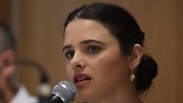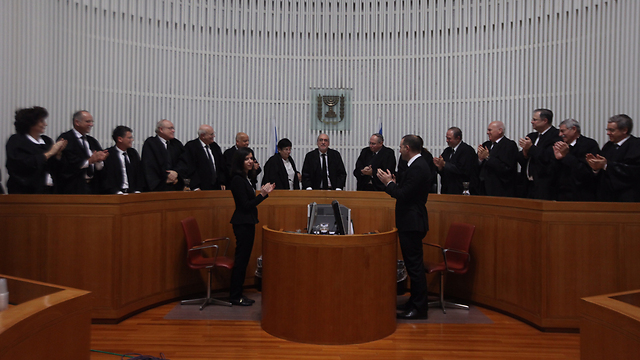
Justice Minister Ayelet Shaked
צילום: מוטי קמחי
Fourth Supreme Court judge announces retirement in 2017
With Supreme Court president Miriam Naor, her deputy Elyakim Rubinstein and two other judges departing next year, the battle to shape the court for the coming decade begins.
Supreme Court Judge Zvi Zilbertal surprised the justice system on Thursday when he announced his intention to retire in a year's time, six years before the end of his term, citing the extreme workload put on the judges.
 The four new judges are expected to be selected as part of a "package deal" - meaning an agreement on the selected candidates will be reached at the same time.
The four new judges are expected to be selected as part of a "package deal" - meaning an agreement on the selected candidates will be reached at the same time.
This brings the number of the judges retiring from the Supreme Court in 2017 to four, as President Miriam Naor, Deputy President Elyakim Rubinstein and Judge Salim Joubran are also retiring next year.
The departure of four judges will lead to a battle to shape the Supreme Court's make-up for the coming decade, and it is likely that Justice Minister Ayelet Shaked will work to put on the bench conservative judges who raise the banner of judicial restraint.

Justice Minister Shaked meets with Supreme Court President Naor (Photo: Justice System's PR) (צילום: מערך הדוברות של הרשות השופטת)
Shaked will head the Judicial Selection Committee. She supports the complete separation of powers between the Supreme Court, the Knesset and the government. She also believes in judicial restraint in Supreme Court rulings on the reasonableness of decisions implementing the government's policies on defense, the territories, political appointments, and religion and state.
In an interview with Yedioth Ahronoth several months ago, Shaked said that "the root of the problem is that Aharon Barak, who is the most outstanding justice of this generation, led a revolution that gave the attorney general and the Supreme Court too much power to restrain the government. Barak said that the government cannot act not just against the law - but also in an unreasonable manner. And who determines whether something is reasonable? The attorney general and the Supreme Court. This we must change."
Officials in the justice system estimated that among the candidates to be considered by the Judicial Selection Committee will be representatives from the religious right-wing sector. The committee is also expected to debate whether to replace Judge Joubran with another representative from the Arab sector and if so, who.
Despite the great power and influence Shaked will wield in the committee, she will still have to convince the other eight members of the Judicial Selection Committee of her choices as a supermajority (seven members) is required to approved an appointment for the Supreme Court.
In addition to Shaked, three Supreme Court judges are on the committee: Naor, Rubinstein and Joubran, as well as Finance Minister Moshe Kahlon, Knesset representatives MKs Nurit Koren (Likud) and Robert Ilatov (Yisrael Beytenu), and representatives from the Israel Bar Association, Elana Saker and Khaled Zoa'bi.
Because of the requirement to have a supermajority, the justice minister and the Supreme Court president often reach agreements in advance and then convince the political and legal representatives in the committee to join them.
Over the last decade, there have been quite a few instances in which these "deals" fell through, and the decision on appointments took a long time.
The relations between Shaked and Naor are good, and they have so far managed to reach agreements on many issues. But while Naor also believes in judicial restraint, she shows judicial activism when it comes to human rights, for example in rulings about the treatment given to illegal migrants.
Officials in the judicial system said Naor wants the selected judges to be of high legal stature and liberal, and that despite her desire to reach an understanding with the justice minister, the Supreme Court president will not allow for contempt of the process.











